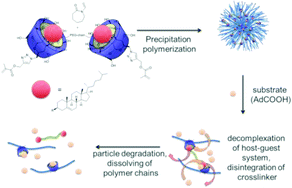Responsive microgels with supramolecular crosslinks: synthesis and triggered degradation in aqueous medium†
Abstract
We report a facile method to synthesize stimuli-responsive aqueous microgels containing degradable crosslinks based on the supramolecular host–guest complexes between β-cyclodextrin and cholesterol. A degradable crosslinker was synthesized by modification of cholesteryl-functionalized poly(ethylene glycol) with mono-methacryl-functionalized β-cyclodextrin and used in the precipitation polymerization of N-vinylcaprolactam to synthesize microgels containing cleavable crosslinks. A series of microgels with variable content of the degradable crosslinker was synthesized and incorporation of the crosslinker was confirmed by FTIR and NMR spectroscopy. Microgels were characterized by dynamic light scattering and electron microscopy to evaluate their size, size distribution and morphology. The degradation of microgels was triggered upon addition of 1-adamantanecarboxylic acid. The degradation process was followed by: (a) dynamic light scattering by monitoring the scattering intensity and hydrodynamic radii and (b) electron microscopy (FESEM) by visualization of the changes in the microgel shape and size. Size exclusion chromatography was used to analyze the degradation products.


 Please wait while we load your content...
Please wait while we load your content...